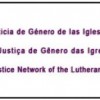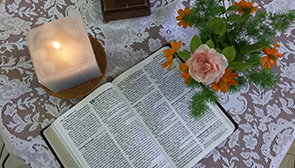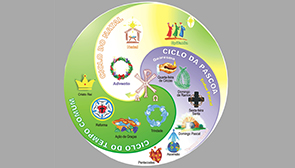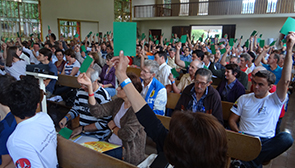Bible Study 6
Pastora Karla Steilmann Franco
Iglesia Evangélica del Río de la Plata
Traducción. Elisa Pérez Trejo - Iglesia Luterana Mexicana.
Silence: A (critical) reflection of Gn 12:10-20
Dear sisters, to begin this Bible Study I invite you to read the text of the book of genesis quoted above carefully.
1 - Keys for reading the text.
A - The book of Genesis is the first one that appears in the order of our Bibles. In this book a fascinating game is made between mythical stories and stories of life and faith of human beings like you and me, putting as central several male characters who were called prophets, patriarchs and fathers of the faith, but also in their lines are they narrate the lives of many women who were an important part of the development of the story, as is the case of Sarai, the character in our text.
B - Abram and Sarai, they were husband and wife and they had left their houses and their land a long time ago. They were walking towards the land that God had promised them. They were not young and had no children. After much walking, they lived in the Bethel region and were foreigners there.
C - This text has a parallel with another account that is found in chapter 20 of the book of genesis. (You can read it too)
D - In the times to which our text refers, women occupied an almost insignificant place in society and did not enjoy rights. They were subject to a man, who could be their father, brother, husband, or someone in the family who took care of them. Marriages on the other hand were normally arrangements between families and not a decision of the couple as it currently is.
2 - What do we see?
Now that we have some contextual data I invite you to read the text one more time. And this time let's pay special attention to the details of the narration.
What do we see in this second reading that I have not seen before? What relationship does this story have with our environment and today? Do the characters remind us of someone we know? Does what happens in the text
remind us of any known history?
3 - Normal ...
We can say that the story of Abram and Sarai is not at all strange, it is simply the story of a husband and wife who seek to survive in difficult times, like so many other couples we know and who surround us. They were already foreigners in the place where they lived and they are forced to migrate once more, this time to Egypt, in search of resources to survive the famine that was lurking in the region where they lived. This time they migrated out of necessity, like so many people we know. Those were other times, there were no means of transportation so they most likely went on foot through the desert. It will have been a long walk because Egypt is not that close to Bethel. They had some belongings, but in the meantime some things were lost coming and going, which is normal, when one moves there are always things left behind or lost. Sometimes material things are lost, other times confidence, hope, security are lost and always a bit of history and some frustrated dreams are ALWAYS left behind.
So far, except for the fact that these characters lived thousands of years ago as semi-nomads in what is now the territory of Palestine and Israel, what happens in the text could actually happen anywhere, in any environment, with any couple, at any time. Sarai accompanies her husband, listens to and obeys
everything he says, supports him, follows him, does not contradict him, does what many other women have done throughout history and continue to do today. It is normal or not? What could or should we be suspicious of?
4 - Silence ...
The truth is that there is much to distrust in this story and in that relationship, but of all things what has surprised me the most and is surprising is SILENCE.
That complicit silence that does not contradict Abram when he decides to use his wife as his safe conduct and deliver her to Pharaoh to save his life, when he makes the woman who accompanied him, his wife, an object and decides on what she can do and how it should act. That social silence that allows Sarai to be treated as if she were an interchangeable object, as if she had no feelings or her own will.
That obligatory silence of Sarai that she could not contradict her husband, who throughout the text does not say a single word. A certainly terrifying silence and full of fear due to the uncertainty of what could happen. A silence perhaps full of anger, disappointment, pain, because the man who should take care of and protect her uses it to save his own skin, regardless of what might happen to her once he was under Pharaoh's property. , who was a strange man, with a lot of power in a country where she was simply an outsider trying to survive.
In Sarai's solitude, in her despair and abandonment, in the silence that was imposed on her, a hint of hope arises that helps her: God. In the face of that voiceless woman, it is God who acts and claims her liberation. God helps Sarai who had been left to her own devices and in the hands of a totally unknown man.
5 - The other Sarais ...
Sarai is the example and the visible face of the violent reality that many women have lived at that time and, despite the historical distance that separates us,
she is still the image of the woman who is used and violated in our days is your rights for your partner or family members.
Sarai is the name of all the women of that time and those of today who have no voice, who live in imposed silence and fear. Those who must silence their sorrows and pains to preserve their lives. She is the image of the woman who lives in a “normal” couple relationship, from the doors out, but who suffers
violence from the doors in.
There are many Sarais of our time who suffer all kinds of violence and rapes and who are surrounded by so many who choose to be in the comfort of silence, and not have to run for help and help. There are so many normal couples that no one distrusts and that they actually hide a history of pain, suffering and violence. Sarai's story was told and continues to this day, but there are so mny stories of violence against women and children that no one tells, that is not known, that she hides, out of fear, impotence or lack of mpathy.
6 - Our silences ...
To finish, I invite you to read the text one last time and reflect on the following questions.
What do I see now in the text? Who does it remind me of? Do I also know someone who suffers some type of violence from their partner or someone around them? How many people do we know who, like Pharaoh, decide to hand over the victim to their aggressor instead of helping her? Have I ever had to shut up in a violent situation due to fear or not knowing what to do? How can I help in such a situation?
God's action in the text is what teaches us that in the face of injustice and violence we must act in favor of the weakest person, the one who is helpless. It is the action of God that calls us not to be silent but to give voice to those who were silent. Let us not be naive, keeping silent does not help the victim, but rather guarantees the aggressor to continue acting with impunity. Let's talk, let's act united by all the Sarais of our days.






















